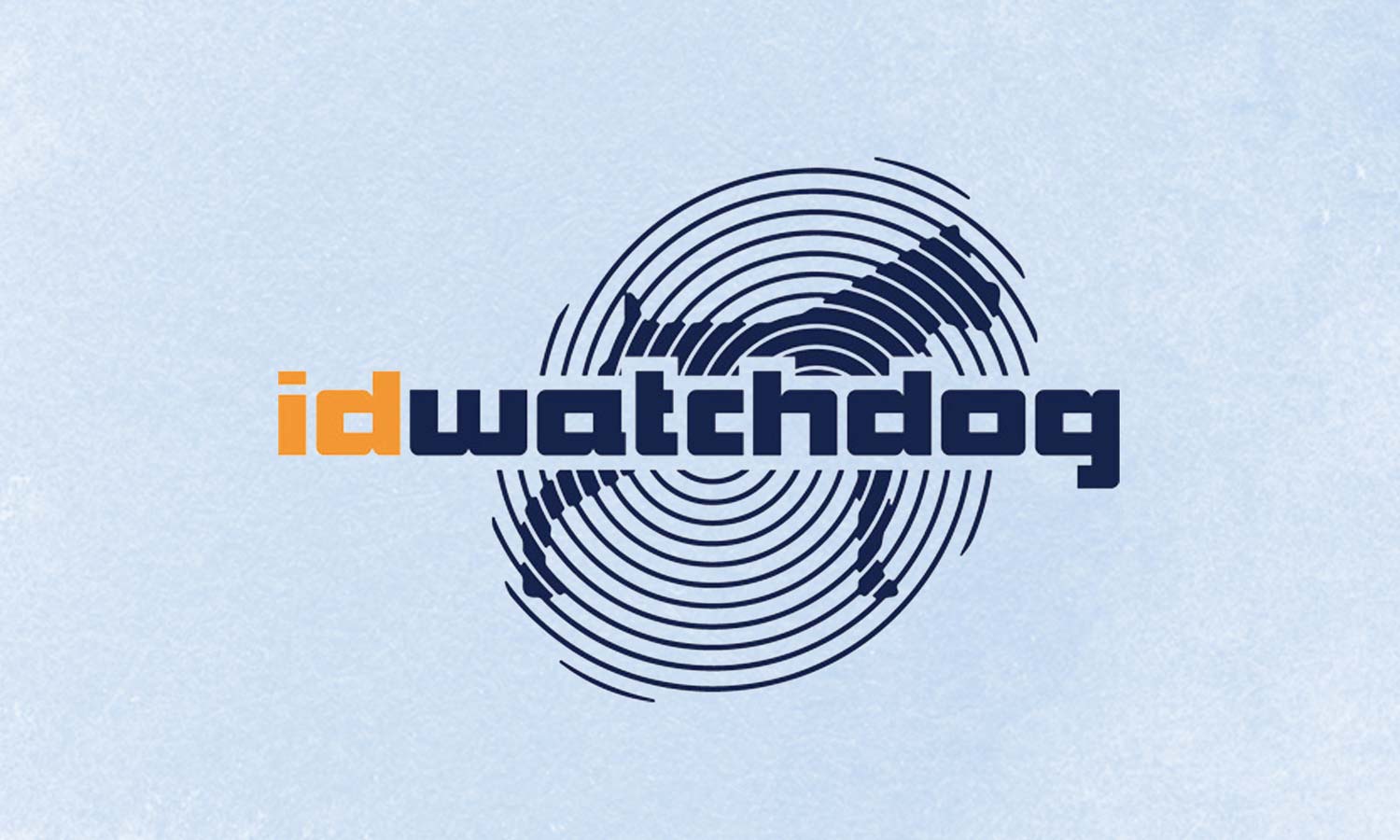Tom's Guide Verdict
ID Watchdog Platinum offers the basics of identity protection, but you'll get more features from other services.
Pros
- +
Monitors the three big credit-reporting agencies
- +
Up to $1 million for remediation
- +
Affordable personal plans
- +
Monitors health care database
- +
Two-factor authentication
Cons
- -
Bare-bones compared to other services
- -
Doesn't actively monitor credit, bank accounts
- -
Credit reports refreshed only yearly
- -
Lacks composite credit score
- -
Owned by Equifax
Why you can trust Tom's Guide
For $20 a month ($18 per month for Tom's Guide readers), ID Watchdog Platinum monitors your files at the top three credit-reporting agencies, while continually searching for indications that your information has been compromised.
The service promises to spend $1 million on restoring your credit; its somewhat-hidden family plan is affordable; and it's one of the few identity-protection services that lets you secure your account with two-factor authentication.
The downside is that ID Watchdog will give you a credit report from each agency only once per year, which you could also get for free. It doesn't actively monitor your credit-card or bank accounts, either.
If you're looking for the basics of identity protection, you could do worse than ID Watchdog's plans, which are relatively inexpensive. But you'll get more features — such as lost-wallet assistance, financial monitoring, frequent credit reports and removal of your name from junk-mail lists — if you're willing to pay more for IdentityForce, Identity Guard or LifeLock.
ID Watchdog was acquired by credit-reporting agency Equifax in the spring of 2017, after Equifax suffered the massive data breach which only became public months later. Nevertheless, ID Watchdog's cheaper plan gets data from only Equifax's rival TransUnion, while its more expensive one handles data from Experian and Equifax as well.
It may seem strange that an Equifax-owned service has a preferential arrangement with a rival credit bureau, but this is likely the result of a long-term contract that preceded the recent acquisition.
I signed up for six different identity-protection services in the fall of 2017 and used each concurrently for three months. To avoid the chance of preferential treatment, neither I nor Tom's Guide told the services my name or email address, although they were informed that Tom's Guide was reviewing them.
Get instant access to breaking news, the hottest reviews, great deals and helpful tips.
MORE: Best Identity Theft Protection Services
Costs and What's Covered
ID Watchdog has two paid programs for protecting your identity and credit. The entry-level, $15-a-month ID Watchdog Plus plan includes identity monitoring, notifications, alerts and credit monitoring from TransUnion.
But it lacks credit-score reporting, which is where the ID Watchdog Platinum plan comes in. That $20-a-month plan includes monitoring and reports from Equifax, Experian and TransUnion. The catch is that you'll get the scores and reports only when you sign up for ID Watchdog, and they won't be refreshed for another year. ID Watchdog does alert you to changes in your credit files, but some other identity-protection services give you access to new credit reports and scores quarterly or monthly.
You'll get more features — such as lost-wallet assistance, financial monitoring and frequent credit reports — if you're willing to pay more for IdentityForce, Identity Guard or LifeLock.
ID Watchdog's plans are cheaper than those from LifeLock, IdentityForce and Identity Guard, but ID Watchdog doesn't advertise any family plan on the company website. You'll have to call for that: An ID Watchdog Plus family plan is $29 per month, while an ID Watchdog Platinum family plan is $36 per month. Each covers two adults and up to five children.
ID Watchdog has something called ID Snapshot, which costs an extra $100. It creates a personal profile that includes your driving record, any outstanding warrants for your arrest and whether you've landed on the terrorist watch list.
Like five of the six services I tried, ID Watchdog has an A+ rating from the Better Business Bureau (LifeLock does not). Most of the online complaints about ID Watchdog that Tom's Guide could find had to do with customer service.
Credit Scores and Monitoring
ID Watchdog Platinum scanned the open and dark segments of the web for my Social Security number, address changes and other data. Like some of its competitors, ID Watchdog checks payday loan outfits as well.
However, ID Watchdog doesn't directly monitor activity on your credit-card or bank accounts. Most other identity-protection services that I tried do perform these checks. Nor does ID Watchdog include a composite FICO or Vantage score that sums up your creditworthiness in one comprehensible number.
In a credit emergency, ID Watchdog promises to help you arrange a credit freeze, but you need to do much of the work yourself. ID Watchdog's ability to dig up ancient records was impressive; it found all but two of my previous addresses over the past 50 years.
Insurance and Services
Like LifeLock Ultimate Plus and IdentityForce UltraSecure+Credit, ID Watchdog says it will spend up to $1 million for remediation and restoration of your stolen identity. A rival service, ID Shield, promises to spend up to $5 million, but there are strings attached with all these promises, which are not insurance plans.
For instance, ID Watchdog says it will spend up to $1,000 for an initial legal consultation and $2,000 for travel expenses related to restoring your credit. If you need to need to miss work to recoup your credit, the company will pay up to $1,500 a week for lost wages for up to five weeks. But you won't receive compensation if there are any stolen funds that your bank or card issuer didn't cover.
ID Watchdog says it will spend up to $1,000 for an initial legal consultation and $2,000 for travel expenses related to restoring your credit.
When you make a claim of identity theft, ID Watchdog promises to form a dedicated theft-recovery team that will investigate and help you to regain your credit. (If you've ever suffered major identity theft, you'll know just how much of a chore restoring your good name can be.) You can check on the team's progress in the service's interface.
Notifications and Alerts
ID Watchdog's Platinum service displayed a wide variety of alerts during the three months that I used it. In addition to monthly reports, the service alerted me to major (and minor) database breaches. The alerts arrive via text message and email.
I found the number of alerts to be overkill, such as when ID Watchdog alerted me that engine-maker Briggs & Stratton may have had 13,000 records compromised. I've got no connection to that company, and receiving this alert made me wonder if ID Watchdog could be the identity-protection service that cries wolf.
The alerts I saw concerned activities on the dark web, payday loans and social-network warnings. The service also keeps an eye out for changes of address and of medical insurance information, and will tell you if a registered sex offender lives near you.
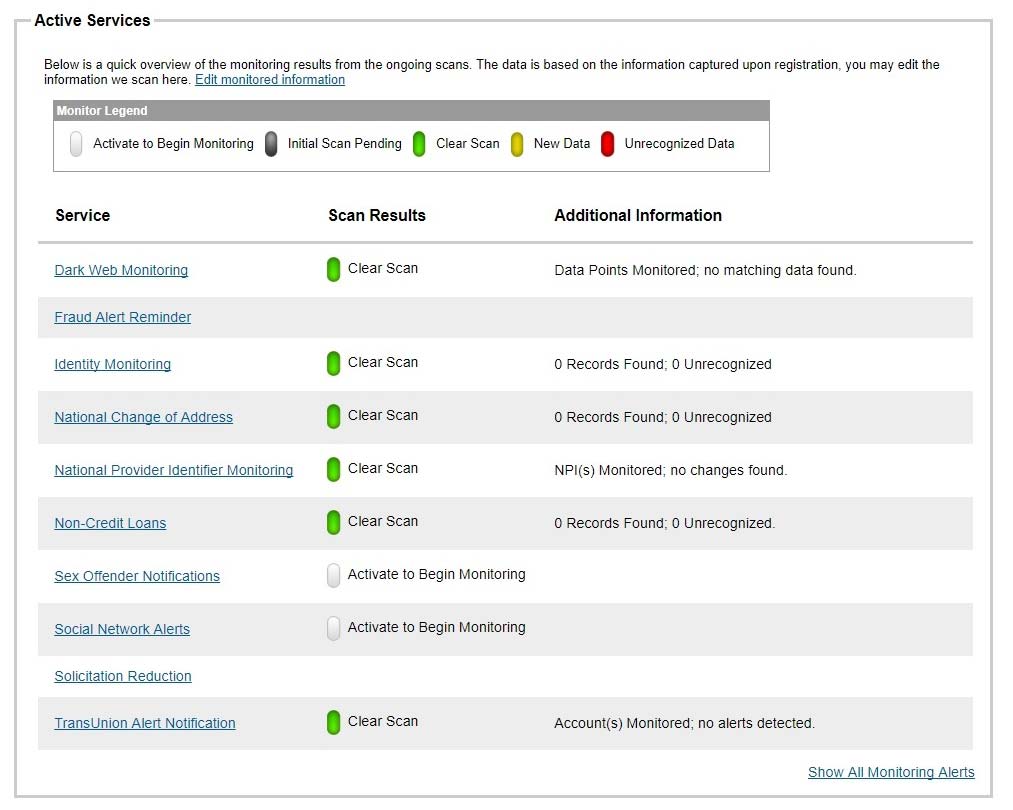
Each of the identity categories in ID Watchdog's website interface has an oval dot that's color-coded for status. A red dot is bad, yellow shows new data, and green indicates a clear scan. It was an easy way to see my status at a glance, and I found it strangely mesmerizing.
I really liked that I could dive into the details behind any of these ratings by clicking on the heading, and I found it easy to change the information and configuration for the color coding. On the other hand, I needed to do this on a separate page that was another two clicks away from the main interface page. You can also choose to just opt out of notifications.
MORE: Identity Theft vs. Credit-Card Theft: What's the Difference?
In the course of nearly three months of daily use, ID Watchdog sent me 15 alerts. I really appreciated getting a monthly update of my credit report with warnings of specific problems, such as changes of address, and I also liked that ID Watchdog consulted the National Provider Identifier database for medical records.
Setup
ID Watchdog's installation is simple, quick and efficient. It took me 7 and a half minutes to set up my account, less than the average of 12 minutes for all services we tested. After I entered my credit card information and picked the Platinum plan, ID Watchdog asked for my Social Security number and date of birth.
ID Watchdog then asked a series of four authentication questions and took me to the service's Dashboard. Unfortunately, while I used the service, it asked the same question every time to authenticate my identity — not a good idea.
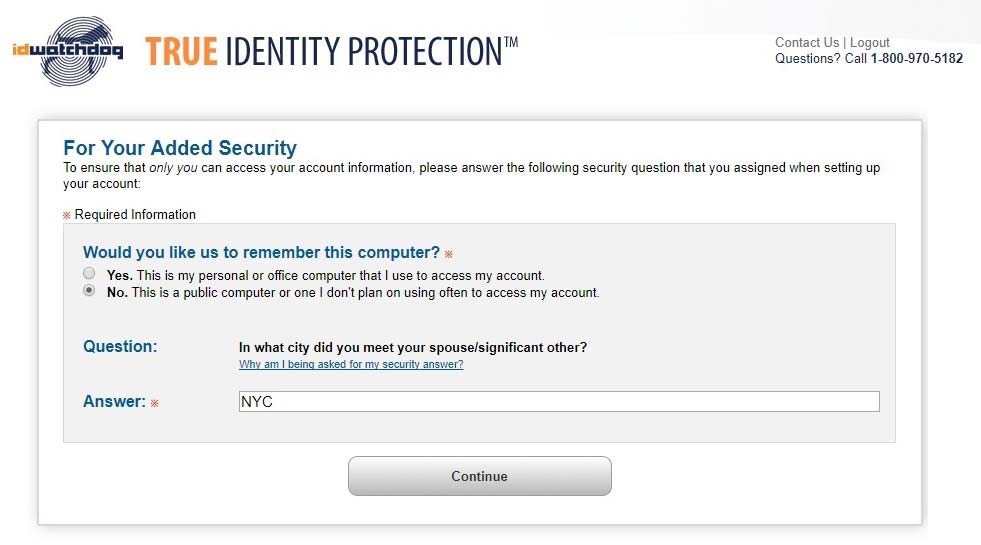
I also set up ID Watchdog's optional two-factor authentication (2FA), which adds another layer of security to your account. Many online services, such as Google and Facebook, offer 2FA, and it's strange that ID Watchdog is one of only two identity-protection services I tested (the other being IdentityForce) that offer this option.
ID Watchdog sends a text message with a code to your phone during the regular 2FA process. But during the enrollment process, the actual code goes to the ID Watchdog mobile app, not your phone's text-messaging app. It took me a little while to figure that out.
If you're in a hurry to protect your identity, look elsewhere. ID Watchdog warned me that the service could take up to 24 hours to get started and begin scanning for problems.
MORE: How to Protect Your Identity, Personal Data and Property
With the ID Watchdog Platinum plan, you get 24/7 service support for anything from simple questions to initiating an investigation of an incident of identity theft. The ID Watchdog website interface has the company's toll-free phone number prominently displayed on two pages, but there's no quick link to jump to the support pages. You can send the service support technicians a general email, though.
After I signed up for ID Watchdog, I sent the service support an email asking whether my personal information had been compromised in the Equifax data breach. My question went unanswered.
By contrast, Credit Sesame, Identity Guard and LifeLock responded with generic suggestions about how to protect my identity. None of the six services I tried gave me a real answer.
I sent the service ID Watchdog an email asking whether my personal information had been compromised in the Equifax data breach. My question went unanswered.
Canceling my ID Watchdog subscription was fairly easy. I needed to call ID Watchdog to do it, but the support techs offered to cut the price to $11.21 per month (down from $20) if I stayed. I told them "no thanks" and got a text confirmation of my cancellation a few minutes after that.
Interface and Utilities
Desktop computer users have to use ID Watchdog's web-based interface, which provides a wealth of information, such as an Identity Overview and its color-coded indications of safety.
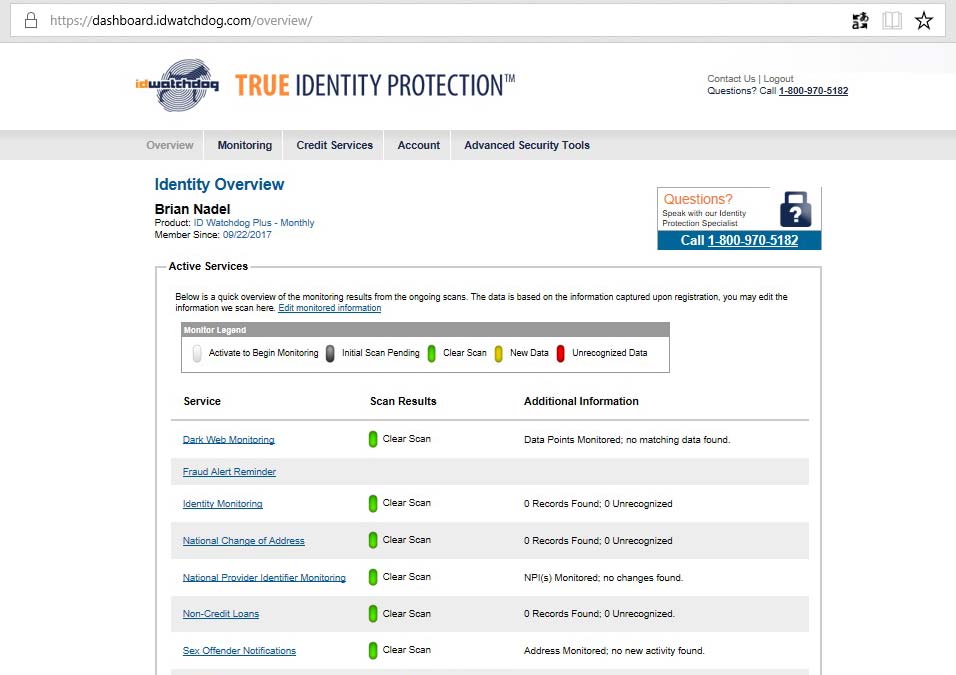
There are 10 indicators shown, including your status for Dark Web, Fraud Alert and Identity Monitoring. ID Watchdog will tell you if a registered sex offender has moved into your area, with the added benefit of letting you pick how big a radius to search. But the first few times I tried it, the interface displayed a blank Google map.
ID Watchdog's social network alerts are a good way to protect your identity, and I really appreciate that ID Watchdog reduces solicitations for preapproved credit cards and loans. I could also see if my data came up in any of the service's data sweeps.
In addition to showing you details about alerts and account information, the service has what it calls Advanced Security Tools. But rather than utilities — such as a password manager or antivirus software, which some other identity-protection services offer — these consist of lost-wallet coverage and details about the insurance policy.
ID Watchdog's social network alerts are a good way to protect your identity.
The 17MB ID Watchdog Android app puts the service's alerts front and center; there's a similar iOS app for iPhones and iPads. In addition to tabs for All, New and Flagged notifications, the app has a section to flag unrecognized notifications. You can also register your wallet's contents in advance, should it get lost or stolen.
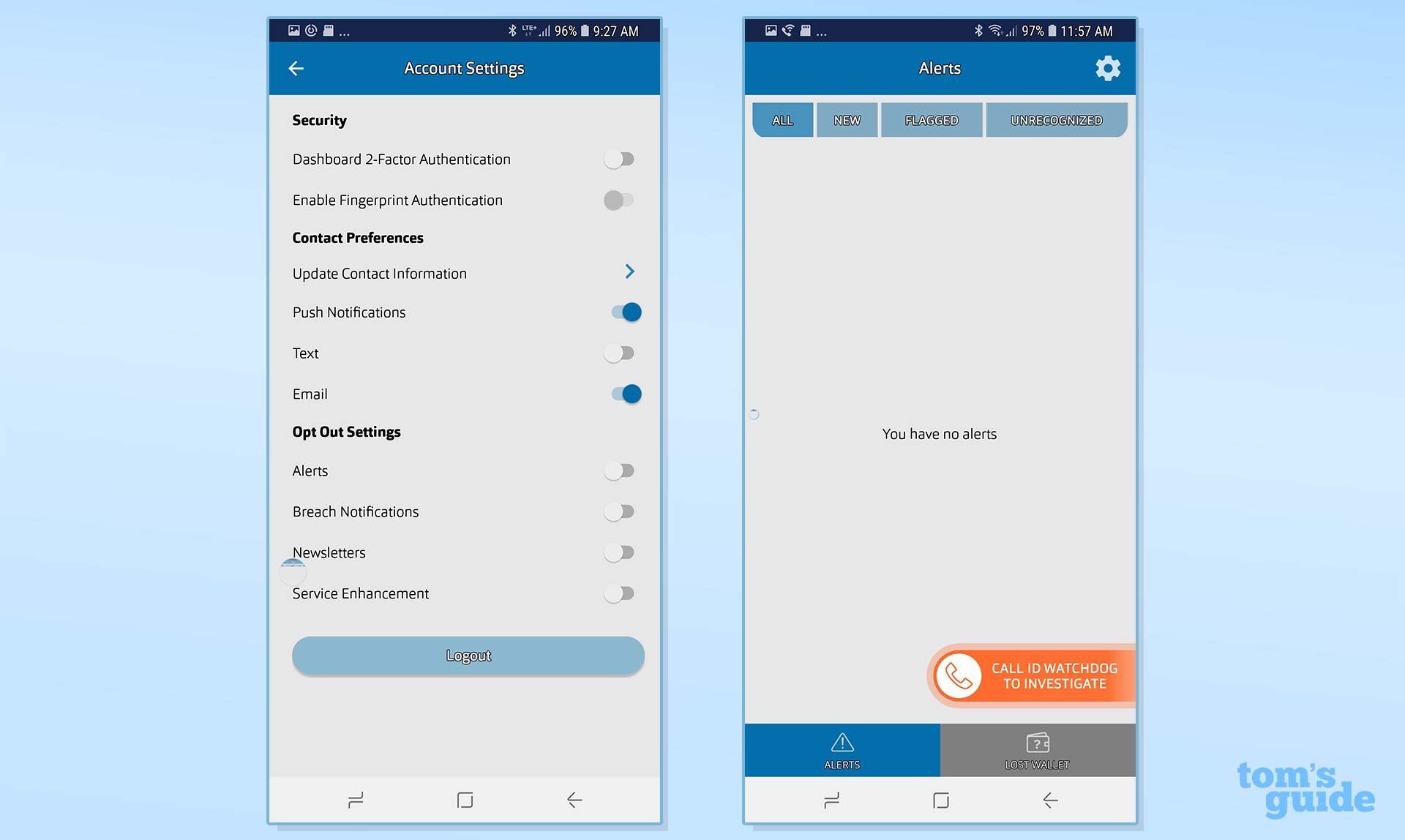
By far, the best feature in the mobile app is the hot button in the lower right of the main screen. You can use this to immediately call ID Watchdog's support staff and start an investigation if you believe your identity has been stolen. This might be enough to reduce anxieties.
Bottom Line
ID Watchdog Platinum combines the scores from the top three credit agencies with a wide variety of monitoring and alerts in an easy-to-read format, and the service promises up to $1 million to help you regain your privacy and identity. At $20 a month, ID Watchdog Platinum provides the basics of identity protection at an affordable rate, but LifeLock, IdentityForce and Identity Guard all do more.
Credit: Tom's Guide
Brian Nadel is a freelance writer and editor who specializes in technology reporting and reviewing. He works out of the suburban New York City area and has covered topics from nuclear power plants and Wi-Fi routers to cars and tablets. The former editor-in-chief of Mobile Computing and Communications, Nadel is the recipient of the TransPacific Writing Award.





